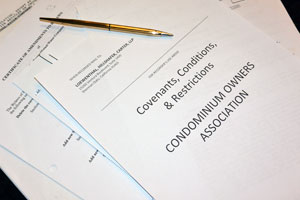LHC Newsletter Vol 3, No. 1
“THE RIGHT TO INSPECT VERSUS ATTORNEY- CLIENT PRIVILEGE”
A significant new opinion issued January 7, 2009 by the Fourth District Court of Appeal directly impacts all homeowners association Boards of Directors. In Tritek Telecom, Inc. v. Superior Court, — Cal.Rptr.3d —-, 2009 WL 32861 (Cal.App. 4 Dist.), 09 Cal. Daily Op. Serv. 232, 2009 Daily Journal D.A.R. 295, the Appellate Court held that even though a corporate director has an “absolute right” to “inspect and copy all corporate books, records and documents of every kind” (as stated in Corporations Code § 1602), including documents protected by the attorney- client privilege, a corporate director does not have the right to access documents covered by the attorney-client privilege that were generated in defense of a suit for damages that the director himself filed against the corporation.
In other words: if a member of the board of directors of a homeowners association has filed suit against the association, she or he does NOT enjoy the “absolute right” to inspect and copy all of the association’s books and records. The suing Board member may not inspect or copy the privileged documents related to the suit. For a property manager, or for a board member other than the one(s) filing suit, this type of situation may pose some serious challenges, particularly relative to their relationship with the board member who filed suit.
Clearly, if a director has filed suit against the association, counsel to the association should be aware of the suit. Thus, it is advisable for the property manager and the other board members for the association to get guidance, at the outset of the suit, from association counsel as to how they should handle inquiries about books and records from the suing board member(s). For an example of such a situation, see the final section of this newsletter (III. Application).
The following sections outline the legal facts, details and an analysis of the recent opinion:
FACTUAL AND PROCEDURAL BACKGROUND
Tritek Telecom, Inc. (“Tritek”) is a California corporation with two equal shareholders and a two member Board of Directors. Conflicts arose between the two Board members regarding the operation and management of the company. One of the two Board members sued the other and the corporation seeking damages. Subsequently, Tritek filed a cross-complaint against the suing Board member alleging breach of fiduciary duties and fraud.
The suing Board member then filed a petition under Corporations Code § 1603 seeking to enforce his right as a director of Tritek to inspect Tritek’s books and records. Tritek and the other Board member answered the petition, asserting the attorney/client privilege and the attorney work product doctrine because the petition requested inspection of privileged documents generated by Tritek in defense of the Board member’s action. The trial court granted the petition, stating that Tritek’s evidentiary showing was insufficient to justify withholding the documents.
DISCUSSION
I. General Legal Principles
A client has a privilege to refuse to disclose, and to prevent another from disclosing, a confidential communication between the client and his or her lawyer unless the privilege is waived. (Evid.Code, § 954.) A corporation is a “client” protected by the attorney-client privilege (Evid.Code, §§ 175, 951; D.I. Chadbourne, Inc. v. Superior Court (1964) 60 Cal.2d 723, 736) and a “confidential communication” includes “a legal opinion formed and the advice given by the lawyer in the course of that [attorney- client] relationship.” (Evid.Code, § 952.) Once a party establishes that a privilege applies, the burden shifts to the party opposing the privilege to demonstrate that the privilege did not apply, that an exception existed, or that there was an express or implied waiver. (Evid.Code, §§
405, 917(a); Titmas v. Superior Court (2001) 87 Cal.App.4th 738, 745.)
Corporate directors have the “absolute right” at any reasonable time to inspect and copy all corporate books, records, and documents of every kind (Corp.Code § 1602) and a court may enforce this right “with just and proper conditions.” (Corp.Code § 1603.) This right “represents a legislative judgment that directors are better able to discharge [their fiduciary] duties if they have free access to information concerning the corporation.” (Havlicek v. Coast-to-Coast Analytical Services, Inc. (1995) 39 Cal.App.4th 1844, 1852.) The absolute right, however, is subject to exceptions and may be denied where a disgruntled director announces his or her intention to violate his or her fiduciary duties to the corporation, such as using inspection rights to learn trade secrets to compete with the corporation. (Id. at pp. 1855-1856.)
II. Analysis
Because the director filed his petition to enforce his inspection rights as a director of the corporation after he filed his action against Tritek, he is not a disinterested director. Moreover, the director’s filing of an action against Tritek makes him Tritek’s adversary. In such a situation, a court may properly limit a director’s inspection rights because the director’s loyalties are divided and documents obtained by a director in his or her capacity as a director could be used to advance the director’s personal interest in obtaining damages against the corporation. (La Jolla Cove Motel and Hotel Apartments, Inc. v. Superior Court (2004) 121 Cal.App.4th 773, 787-788 [corporate counsel has no duty to disclose privileged information to dissident director with which the corporation has a dispute].) Accordingly, the Appellate Court held that a corporate director does not have the right to access documents that are covered by the attorney-client privilege and were generated in defense of a suit for damages that the director filed against the corporation.
III. Application
Although infrequent, there is always the possibility that a Board member, like any member of the association, will sue the association for damages. For example, a Board member could sue when, after a common area issue causes damage to his self, unit or personal property, the Board member is not made whole. In such a situation, the suing Board member should be excused from executive session when his lawsuit is discussed, during conversations with association counsel regarding the lawsuit, and the Board member should be prevented from seeing the association’s documents covered by the attorney-client privilege that were generated in defense of the director’s suit for damages.
© 2009 by Loewenthal, Hillshafer & Carter, LLP. All rights reserved. Permission is granted to reproduce or transmit in any form any part of this newsletter as long as proper attribution to Loewenthal, Hillshafer & Carter, LLP is given. Due to the rapidly changing nature of the law, information contained in this publication may become outdated. As a result, lawyers and all others using this material must research original sources of authority.


